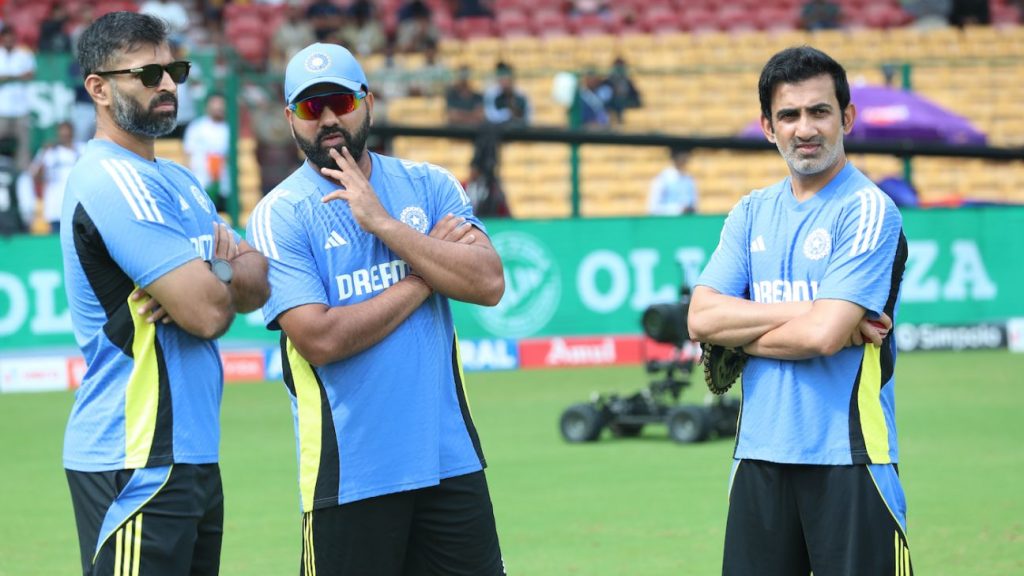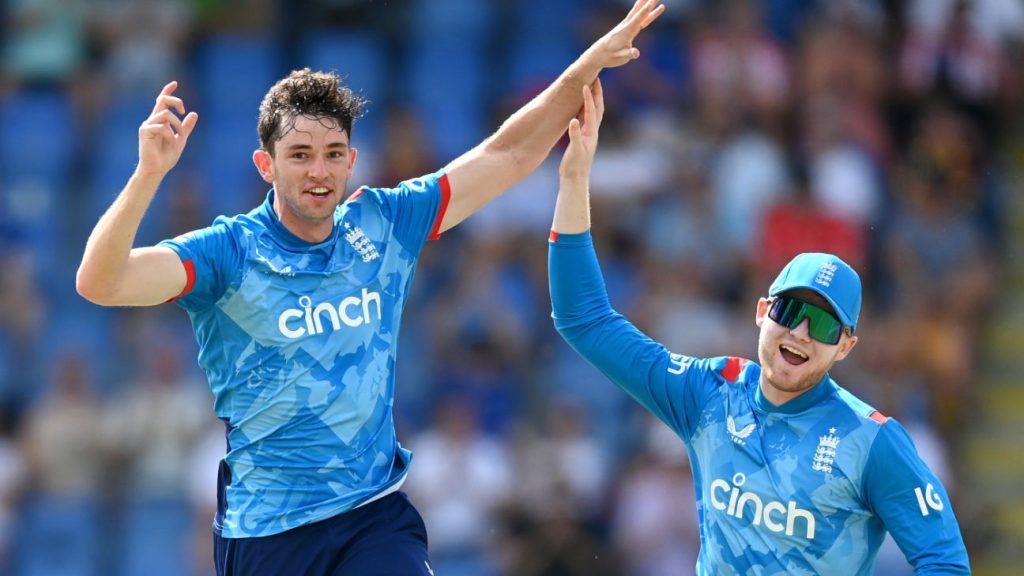In light of racism and misogyny, Rudy Lindblade discusses the difficulties of guiding the British activity.

At Forthill cricket ground, near Dundee, as Scotland were securing victory over Namibia in a CWC League 2 ODI, a cheerful and energetic Australian woman could be seen doing the rounds, chatting with locals in between cheering on Richie Berrington's team. There was no indication, as she smiled and shook hands, that she has taken on perhaps international cricket's most difficult job.
In August 2023, Trudy Lindblade was overseeing the world's biggest-ever cycling event in Glasgow. As CEO of the inaugural UCI Cycling World Championships, she oversaw world titles being contested in 13 different disciplines.
Two months later, Lindblade signed on as CEO of Cricket Scotland, an organisation still suffering the devastating fallout from the 2022 independent investigation that found it to be institutionally racist, making headlines around the world. As a result of the "Changing the Boundaries" report, Cricket Scotland has been operating under "special measures", effectively overseen by the government sports body, Sport Scotland. Soon after Lindblade stepped in as interim CEO Pete Fitzboyden's replacement in early 2024, Cricket Scotland released its internal McKinney Report revealing a culture of sexism and misogyny within the game.
A carousel of board members had come and gone in the previous two-and-a-half years. Lindblade herself is the fifth CEO to take charge in that time. Which begs the question: why would a successful senior female administrator align herself with an organisation seemingly mired in 'isms' and struggling to restore its damaged reputation off the field?
"I knew this role would be tough because I'd been watching and observing some of the media that was coming through while I was doing the Cycling World Championships," Lindblade told ESPNcricinfo. "But when you're in it, it's much more complex and more difficult than you can possibly imagine. That said, I'm determined to find a way through this for everyone. I've delivered hard projects before, worked in difficult environments before. This is certainly the most difficult environment I've worked within. But I can see the opportunity and it is worth it to get through to the other side. That's the message that I want to send because I want people to work on that opportunity with me. I really believe it's there if we get everybody pulling in the same direction."
In the five months since she became CEO, further delicate and complex situations - both legally and on a human level - have emerged. As Scotland impressed on the field at the ICC Men's T20 World Cup, former Scotland seamer John Blain - who was named in separate investigations into racism at Cricket Scotland and Yorkshire - released a letter he'd received from Fitzboyden in January, claiming it exonerated him of all charges. Cricket Scotland has since clarified that the letter amounted only to an inability to proceed further on the allegations against him. Blaine subsequently threatened legal action as things became messy, claimING Lindblane had phoned him and confirmed the contents of Fitzboyden's letter in the early weeks of her tenure.
Lindblane acknowledged she did speak to Blain but refused to go into detail about this, or any other cases that were part of the referrals investigative process after the initial report came out. But she stressed that Cricket Scotland is open to and engaged in ongoing dialogue and mediation for both complainants and those accused.
"We have a new board, new leadership and we've been through two of the most difficult years a sporting organisation can go through. When we're ready and equipped, Full Membership should be on our agenda. But we need to have all our building blocks in place"
Then, ahead of Scotland's Cricket World Cup League 2 home fixtures against Namibia and Oman, Hamza Tahir announced his retirement from international cricket, publicly detailing numerous racism-related grievances and also threatening legal action.
While Blain's case was part of the "Changing the Boundaries" review, which concluded during the Men's T20 World Cup, Tahir's complaints are currently being investigated through Cricket Scotland's new policies and procedures, also announced in June.
"We'd like to have the conversations with Hamza directly," Lindblade said. "And I understand it's within his right to do what he wishes to do, but I would have liked it to have been through this investigation and then he could determine whether he wished to make a public statement after it's concluded, as opposed to whilst we're in the process."
The cases of Blain and Tahir illustrate the delicacy and complexity of the task at hand. Lindblade's biggest challenge is charting a path forward for cricket in Scotland while also dealing justly with the problems of the recent and distant past. She acknowledges there will be ongoing hurt and anger as well as dissatisfaction with outcomes. But she is hopeful a process of mediation will go some way to resolving cases from the "Changing the Boundaries" investigation, the majority of which did not result in further disciplinary action (and instead led to a number of learnings Cricket Scotland says it either has or will take on).
She is drawing on more than 25 years of administration experience that started at the Carlton Australian Football Club in Melbourne, followed by stints in public affairs and events delivery at Cricket Australia's predecessor, the ACB.
She was in charge of the events department at the 2007 Men's World Cup in the Caribbean and the first World T20 in South Africa that followed before switching focus to cycling.

That one of Lindblade's first tasks in her current role was to deal with the McKinney Report's finding of systemic sexism and misogyny is somewhat ironic. She says she was shocked to discover the report was coming but not its conclusions.
"As a female leader working in mainly male sports you observe lots of different things," she said. "That's why I probably wasn't surprised. But I wouldn't say that specifically about Cricket Scotland. We are just one part of a bigger society that has to consider these issues.
"I'm a fairly strong character. I just get on with things and move forward. I've been really fortunate to work for terrific leaders and male leaders that have given me incredible opportunities. However, outside of that, yes, there probably have been times where getting my career started was made particularly difficult because I was looking to get into a male dominated sport.
"There are a small number of female CEOs among the Associate Members and, through the support of ICC Europe, we have a female leadership group that gets together on a regular basis. I think that's really terrific that there are more women starting to take on senior leadership roles within cricket federations. We'd like to see that replicated not just across Associate Members, but into Full Members and other areas. We can do it. We might sometimes have maybe a more empathetic way, we might do things a bit differently, but that's because we're inpiduals. Doesn't matter whether you're male or female. We all have our own way in which we lead people."
Six months into Lindblade's tenure, Cricket Scotland is poised to release a four-year strategy. Unsurprisingly, given the events of the past two years, women and girls - as well as equality in general - are front and centre, along with ensuring CS becomes a trusted and effective governing body. The strategy has been a year in the making, stemming from a consultation process begun under Fitzboyden, and refined under Lindblane.
Those hoping to see Scotland push for Full Membership and Test status will be disappointed. The strategy calls for sustainable success on the pitch and, while not ruling out a future tilt, Lindblade says the organisation first needs to put its house in order.
"We have a new board, we have new leadership, and we have been through two of the most difficult years a sporting organisation can go through. When we're ready and equipped, that Full Membership should always be on our agenda. But we need to have all our building blocks in place so that if and when we do get to that point, we can do it and do it well. There's a lot of things that have to happen before that though, both from a governance point of view but also on the field. We want to be playing more cricket, both men and women, against the best countries in the world."
A men's T20 International series at home to Australia in September is a promising start. And, aside from their performance at the Men's T20 World Cup, Scotland have appeared in this year's Men's Under-19s World Cup and qualified for the upcoming Women's T20 World Cup, suggesting talent pathways are improving depth. Lindblade is hopeful the steps taken by Cricket Scotland will see the special measures imposed by Sports Scotland lifted, although there is no specific timeframe. But there is still a long way to go before the game can move forward unencumbered by the past.
"The strategy is not going to solve everything we've been through, and I don't think anyone would expect that. But it does provide us a path forward and a focus, not just for Cricket Scotland, but for everyone within Scottish cricket. It's going to take a long time because of the hurt, the unhappiness, for everyone who's been impacted by what's happened. But we need to move forward and have that self-awareness of what people are feeling and why and that's really important.
"This is about uniting communities and people through cricket. It's to make Scottish cricket better every day. It's a really big moment for Scottish cricket and for Cricket Scotland. And it's really exciting."
Copyright Notice:
Datavictory copyrights this specification. No part of this specification may be reproduced in any form or means, without the prior written consent of Datavictory.
Link:


